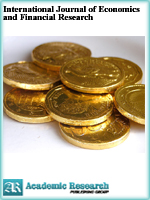International Journal of Economics and Financial Research
Online ISSN: 2411-9407
Print ISSN: 2413-8533
Print ISSN: 2413-8533
Quarterly Published (4 Issues Per Year)

Archives
Volume 4 Number 11 November 2018
Effect of Imports and Exports on Balance of Foregin Trade in Nigeria (GDP)
Authors: Okeke Charles C.
Pages: 349-353
DOI: doi.org/10.32861/ijefr.411.349.353
Abstract
This study investigates specifically the effect of Imports and Exports on Balance of Foreign Trade in Nigeria (GDP). Data were collected for period 2007 – 2016. Multiple Regressions Approach and Correlation Analysis was used, defining Imports, Exports and Openness as independent variables and Gross Domestic Product (GDP) as dependent variable. From the analysis, Imports, Exports and Openness contributes immensely to the Nigeria Gross Domestic Product (GDP). Contrary, Imports is positively and significant on Balance of Foreign Trade in Nigeria (GDP), Exports has positively and insignificant on Balance of Foreign Trade in Nigeria (GDP) and Openness has positively and insignificant on Balance of Foreign Trade in Nigeria (GDP). Also, there is a perfect positive association on gross domestic product between imports on the balance of foreign trade in Nigeria and it is significant, with a perfect positive association on gross domestic product and imports between exports on the balance of foreign trade in Nigeria and it is significant and there is a negative moderate association on gross domestic product, imports and exports between openness on the balance of foreign trade in Nigeria and it is insignificant. This study therefore recommends that Nigeria should enhance her Imports & Exports promotion strategies and expanding the Import sector for easy importation.
Short Term Performance Implications of Privately Quoted Companies After the Announcement of Merger and Acquisition: A Case of UAP Holding Limited in Kenya
Authors: Benjamin O. Abongo
Pages: 337-348
DOI: doi.org/10.32861/ijefr.411.337.348
Abstract
The contemporary business environment has been highly complex and dynamic with organizations facing unprecedented amount of competition due to globalization and technological innovations. Merger and acquisition is one of the most popular organization strategy that organizations apply when faced with this kind of operating environment acquiring resources, skills, and competencies beyond their organization control. Many studies have been done to support implementation of M&As within organizations but they have indicated conflicting outcomes with some showing that it negatively affect organization performance and others indicating they positively affect performance. However, none of the studies done has concentrated on the effect within the privately traded organizations and very few but conflicting studies have been done on this relationship in Kenya. This study therefore sought to assess the effects of merger and acquisition on the performance of privately trading organizations in Kenya. The study was grounded upon the efficiency theory, the market power theory, and economic production theory. Reviewed literature revealed existing gaps related to the literature. The study adopted descriptive research design on short run data collected at UAP Insurance within the pre-merger (2012-2014) and post-merger (2015-2017) periods for various performance statistics, where descriptive analysis was applied to assess the differences and independent sample t-test. The study found that M&A affects the net profit margin, Return on Assets, Return on Equity, and earnings per share with all these performance indicators showing that the post-merger period had poorer performance than the pre-merger period. The study further observed that the M&A implementation caused serious disruptions in the operating environment and organization culture of the organization, which was bound to have negative implications on organization performance, employees and shareholders. The study recommends that organizations should avoid M&A strategy unless their current assets are able to fund their current liabilities beyond the short run period, as the declined performance was linked to the disruptions experienced from M&A implementations. The study also recommends that M&A intended changes should occur sequentially to cushion the organization internal operations from the disruptions due to the changes. Study suggests further studies assessing the long term impact of M&A on organization performance.
Studying the Impact of Exchange Rate Fluctuations on the Stock Returns-an Empirical Study on the Stock Companies Listed in the Damascus Securities Exchange During the Crisis Period
Authors: Hasan Yousef El-Mousawi ; Rania Zrair
Pages: 322-336
DOI: doi.org/10.32861/ijefr.411.322.336
Abstract
The research studies the impact of the exchange rate fluctuations of the local currency on the share dividends exchanged in the stock market, and stating whether there is a trace of the fluctuations occurring in the exchange rate on the fluctuations reflected on the stock returns in the stock market – during the political and economic crisis in Syria. The descriptive analytical approach was adopted to indicate whether there is any direct or indirect impact of fluctuations in the exchange rate of the pound (Lira) against the dollar on the exchange value of the Damascus Securities Exchange Index. The study community consists of all stock companies listed in Damascus Securities Exchange. It covers the total of 23 listed companies. It relied on the period from 1/7/2011 through 12/31/2013 to study the impact of exchange rate fluctuations on stock returns, where the crisis began on 18/03/2011, but reflections on economic life began to appear in mid-2011 when the severe fluctuations in the exchange rate and returns began as a result of lack of stability and economic siege Syria has been witnessing and the study stretched until the year 2013. The data is a sort of daily observations of each of the dependent and independent variable sending with 381 observations. The study reached the many results some of which include that there is an inverse weak between the Syrian pound exchange rate and Damascus Securities Exchange Index returns. The inefficiency of Damascus Securities Exchange Index on the weak level, where, as we have seen, this index is not subject to normal distribution and it is auto-correlated of the third degree and does not settle at the first level; instead, it settles at the first change.



